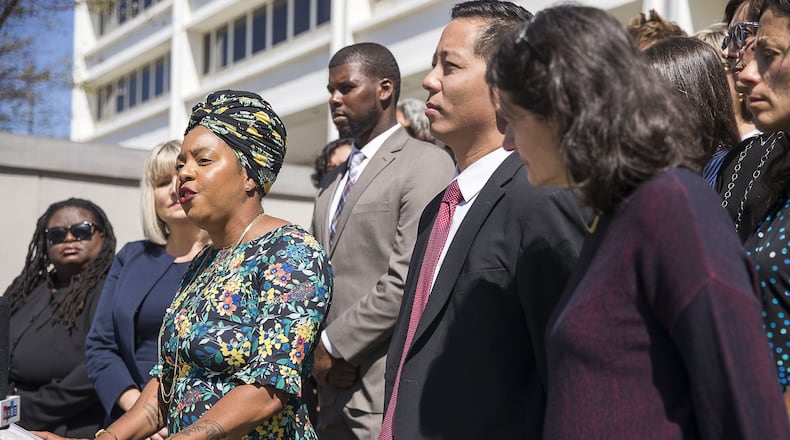Now that the U.S. Supreme Court has overturned the Roe v. Wade ruling that guaranteed the right to an abortion, Georgians are bracing for the implementation of the state’s 2019 law that vastly limits access to the procedure.
Abortion providers in Georgia and across the country have been preparing for the day the official ruling would be released after a draft opinion was leaked earlier this year that indicated the court was poised to overturn the nearly 50-year-old decision.
Anti-abortion activists attending the National Right to Life convention in Atlanta on Friday began celebrating when the news broke. The energy was electric as attendees spent the day sharing tears, hugs and congratulations.
“I have prayed for this day for many years,” said Suzanne Guy, an anti-abortion activist from Marietta. “Now, the pro-life movement will continue to be, even more so, here to help these precious, pregnant mothers that are scared or angry to show them that we are here with tangible help and hope wrapped in compassion and kindness and friendship.”
Credit: arvin.temkar@ajc.com
Credit: arvin.temkar@ajc.com
SisterSong Women of Color Reproductive Justice Collective, along with reproductive rights groups and abortion providers, sued the state in 2019 after the Legislature passed a law outlawing abortion in most cases once a doctor can detect fetal cardiac activity, typically about six weeks into a pregnancy and before many women know they are pregnant.
A challenge to Georgia’s law has been pending before a three-judge panel of the federal appeals court in Atlanta. In September, the panel put the case on hold, deciding to wait for the U.S. Supreme Court’s ruling in Dobbs v. Mississippi.
Now that the Supreme Court has ruled on the Dobbs case, it is likely the Georgia law will be upheld. The question becomes when and how. Georgia Attorney General Chris Carr on Friday said he filed paperwork in federal court asking the judges to allow the law to go into effect.
Abortion will remain legal in Georgia until a decision is made by the courts.
The 11th U.S. Circuit Court of Appeals could uphold Georgia’s anti-abortion law or the three-judge panel could quickly return the case to U.S. District Judge Steve Jones in Atlanta, who struck down the Georgia statute in 2020, with instructions to uphold it.
Jones found the law violated a woman’s right to abortion as established by the precedent set in Roe v. Wade.
Abortion rights activists said that, while they’d been preparing for the decision since the draft opinion on the Mississippi case was leaked in May, it was still “devastating.”
“I feel gutted,” said Kwajelyn Jackson, executive director of Feminist Women’s Health Center, an abortion clinic. “I don’t think anyone, including the proponents, can truly anticipate the devastating effect this will have on Georgians.”
SisterSong Executive Director Monica Simpson said now is the time for those upset about the ruling to spring to action.
“We are not rolling over and allowing a court steeped in white supremacy to strip away our freedom,” Simpson said. “Our opposition has made their plan clear and has been working for decades to get us to this moment. This is not just about abortion. These attacks are about their desire to stay in power.”
Georgia’s law is different from other states’ “heartbeat” statutes because it includes so-called personhood provisions, where rights are extended to an embryo once fetal cardiac activity can be detected. Parents would be able to claim a fetus, once a heartbeat is detected, on their state income taxes as a dependent, and the measure would also require state officials to count an unborn child toward Georgia’s population. Mothers can also file for child support once cardiac activity is detected.
If the appeals court agrees to let Georgia’s law take effect, state agencies — such as the Department of Revenue, the Division of Child Support Services and the Georgia State Patrol — will have to figure out how to uphold and enforce those personhood provisions.
By overturning Roe v. Wade, the power to regulate abortions falls to the states.
Numbers from the state Department of Public Health show 31,248 abortions were performed in 2020, a rate of 9.3 abortions per 1,000 females between the ages of 10 and 55. The agency has not yet released numbers for 2021. After declining over the past two decades, 2020 marked the third consecutive year the rate of reported abortions increased in Georgia.
Any time abortion is mentioned in the news, providers receive an uptick in calls with questions, while requests for abortions remain about the same. Requests for birth control, especially the long-term intrauterine devices that can prevent pregnancies for up to seven years, also tend to spike. Providers are expecting those numbers to increase now that Georgians’ access to abortion is about to be severely limited.
Georgia’s new law — if it is upheld — would allow abortions even after a doctor detects fetal cardiac activity in cases of rape, incest, if the life of the woman is in danger or in instances of “medical futility,” when a fetus would not be able to survive after birth. A police report is required in order to obtain an abortion after six weeks of pregnancy because of rape or incest.
Under current Georgia law, passed by the Legislature in 2012, abortions are allowed through 20 weeks of gestation, or about 22 weeks of pregnancy.
Wesley Smith, a podcast host with the Discovery Institute’s Center on Human Exceptionalism who was speaking at the Right to Life convention when the decision came down, told attendees that they had won a battle, not the war.
“What’s going to have to happen now is the pro-life movement is going to have to (disprove) that lie that you only care about unborn babies,” Smith said. “You’re going to have to step out and care for the children that are born and care for the women that are in (need).”
About the Author
Keep Reading
The Latest
Featured





